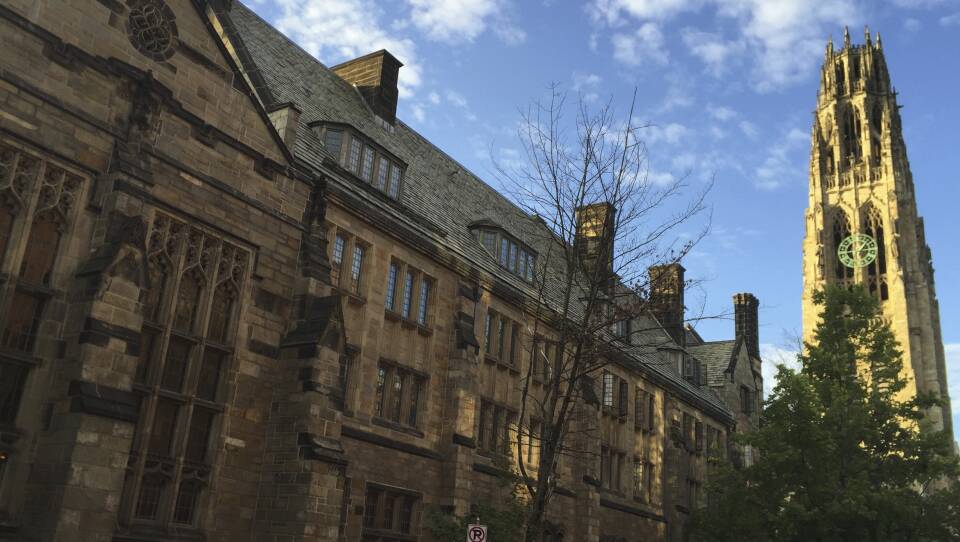The U.S. Department of Education says it is opening an investigation of Yale and Harvard universities for failing to disclose hundreds of millions of dollars in gifts and contracts from foreign donors.
The two Ivy League schools have been singled out in a federal crackdown on institutions of higher learning for allegedly not reporting foreign donations of more than $250,000, as required by law under Section 117 of the Higher Education Act.
The Department of Education said Yale failed to disclosed a total of $375 million in foreign money and that it was concerned that Harvard may not have fully complied with reporting requirements.
"This is about transparency," Secretary of Education Betsy DeVos said in the statement. "If colleges and universities are accepting foreign money and gifts, their students, donors, and taxpayers deserve to know how much and from whom."
A letter from Reed Rubinstein, the DOE's principal deputy general counsel, to Yale President Peter Salovey, accused the university of not reporting "a single foreign source gift or contract" in the period 2014 to 2017, despite the school having sites in dozens of countries.
In a similar letter to Harvard President Lawrence Bacow, Rubinstein said the Education Department was "aware of information suggesting Harvard University lacks appropriate institutional controls."
The Wall Street Journal first reported the investigation on Wednesday. The probe of Yale and Harvard is part of a larger examination by the DOE, which says its enforcement efforts, since July, have triggered the reporting of approximately $6.5 billion in previously undisclosed foreign money, much of it from China, Saudi Arabia, Qatar and the United Arab Emirates, according to the department .
In an email to NPR, Yale spokesperson Karen Peart said that the university had "received a Department of Education request for records of certain gifts and contracts from foreign sources."
"We are reviewing the request and preparing to respond to it," she said.
In a similar emailed response, Harvard spokesman Jonathan Swain confirmed that the school had received a "Notice of Investigation" from the DOE and was likewise preparing a response.
Last year, the department also sent letters to Georgetown University, Texas A&M University, Cornell University, Rutgers University, the Massachusetts Institute of Technology and the University of Maryland.
In the case of Yale, the letter from the DOE specifically requested all records from the school related to gifts or contracts from Saudi Arabia, Saudi nationals, China, Huawei Technologies and ZTE. Huawei and ZTE – Chinese technology companies with ambitions to provide the global infrastructure for the next generation 5G mobile networks — were placed on a U.S. sanctions blacklist last year. The U.S. has said Huawei is a national security threat, and the company has frequently come in for criticism from President Trump.
The DOE's letter to Harvard follows the recent arrest of Charles Lieber, the chair of the university's Department of Chemistry and Chemical Biology. Lieber was charged with making "false, fictitious and fraudulent statements" to the U.S. Department of Defense about his ties to a Chinese government program to recruit foreign scientists and researchers.
In an affidavit, the FBI said Lieber, who led a group focused on nanoscience, had established a research lab in China's central city of Wuhan, apparently without the university's knowledge.
In February of last year, a Senate report described China's influence on the U.S. education system as "effectively a black hole," because universities were failing to report foreign money.
A letter from DOE general counsel Rubinstein to Sen. Rob Portman (R-Ohio), the chairman of the committee which authored the report, said China's Communist Party "invests strategically" in the U.S. education system and that "the public lacks an accurate or complete picture of China's overall spending because nearly 70% of colleges and universities who accepted such donations from China failed to report them." It said Chinese money comes with "strings that can compromise academic freedom."
But blame for this "black hole" should not fall solely on institutions of higher learning, argues the American Council on Education (ACE), which represents hundreds of colleges and universities.
In a July letter to the Education Department, ACE's senior vice president for government relations, Terry W. Hartle, pointed out that, in the more than three decades since Section 117 was added to the Higher Education Act, the provision has been a source of "confusion" for schools, and the department has never made an effort to write clarifying rules.
"Compliance requires a clear, unambiguous understanding of obligations," Hartle wrote. "It is patently unfair to enforce requirements that do not exist in writing."
Copyright 2020 NPR. To see more, visit https://www.npr.org.




